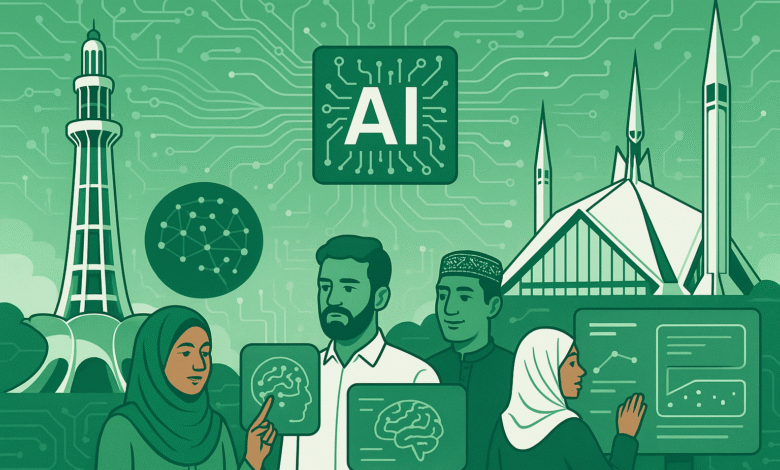AI Ethics in Pakistan: Addressing Bias and Privacy Concerns in Local AI Development
Explore AI Ethics in Pakistan: addressing algorithmic bias, privacy concerns & regulatory frameworks in local AI development. Essential guide for 2025.

Pakistan stands at a crucial crossroads in its technological evolution. As artificial intelligence rapidly transforms industries across the nation, from healthcare to finance, the importance of establishing robust ethical frameworks cannot be overstated. AI Ethics in Pakistan represents more than just academic discourse—it embodies the foundation upon which the country’s digital future will be built.
The emergence of artificial intelligence technologies in Pakistan has brought unprecedented opportunities alongside significant challenges. While AI systems promise to revolutionize everything from agricultural productivity to urban planning, they also raise fundamental questions about fairness, transparency, and individual rights. Understanding these ethical implications is essential for ensuring that Pakistan’s AI development serves all segments of society equitably.
The Current Landscape of Artificial Intelligence in Pakistan
Pakistan’s AI ecosystem has experienced remarkable growth over the past decade. The country has witnessed the emergence of numerous AI startups, increased government investment in digital infrastructure, and growing adoption of machine learning solutions across various sectors. This rapid expansion has created both excitement and concern among stakeholders.
Major Pakistani cities like Karachi, Lahore, and Islamabad have become hubs for AI innovation. Tech companies are developing solutions for local challenges, including traffic management systems, crop monitoring applications, and financial inclusion platforms. However, this growth has outpaced the development of comprehensive ethical guidelines, creating a regulatory vacuum that needs immediate attention.
The Pakistani government has begun recognizing the strategic importance of artificial intelligence. Initiatives such as the Digital Pakistan Vision and various IT policy frameworks acknowledge AI’s potential while hinting at the need for responsible development practices. Yet, comprehensive ethical guidelines specifically addressing AI Ethics in Pakistan remain in their infancy.
Understanding Algorithmic Bias in the Pakistani Context
Algorithmic bias represents one of the most pressing ethical challenges facing AI development in Pakistan. These biases can manifest in various forms, each carrying significant implications for Pakistani society’s diverse fabric.
Cultural and Linguistic Bias
Pakistan’s rich cultural diversity presents unique challenges for AI systems. With over 70 languages spoken across the country and distinct cultural practices varying by region, AI models trained on limited datasets risk perpetuating cultural biases. For instance, natural language processing systems primarily trained on Urdu or English may inadequately serve speakers of regional languages like Sindhi, Balochi, or Pashto.
Machine learning algorithms used in recruitment platforms might inadvertently favor candidates from specific educational backgrounds or geographic regions, potentially discriminating against talented individuals from underrepresented communities. This bias can reinforce existing socioeconomic disparities and limit opportunities for marginalized groups.
Gender and Socioeconomic Bias
Gender bias in AI systems poses particular concerns in Pakistan’s context. Traditional gender roles and limited women’s participation in certain sectors could lead to biased training data. AI systems used in hiring, loan approval, or educational recommendations might perpetuate these historical inequalities if not carefully designed and monitored.
Socioeconomic bias presents another significant challenge. AI systems trained on data primarily from urban, affluent populations may not adequately serve rural or economically disadvantaged communities. This digital divide could exacerbate existing inequalities rather than bridge them.
Religious and Ethnic Considerations
Pakistan’s diverse religious and ethnic landscape requires careful consideration in AI development. Systems that fail to account for religious practices, dietary restrictions, or cultural sensitivities could inadvertently discriminate against specific communities. For example, recommendation systems in e-commerce platforms must be sensitive to religious observances and cultural preferences.
Privacy Concerns and Data Protection in Pakistani AI Systems
Data privacy represents a cornerstone of ethical AI development, yet Pakistan faces significant challenges in establishing comprehensive data protection frameworks. The rapid digitization of services and increasing data collection by AI systems have created an urgent need for robust privacy safeguards.
Personal Data Collection and Usage
Pakistani AI companies often collect vast amounts of personal data through mobile applications, online platforms, and IoT devices. This data collection frequently occurs without adequate user consent or transparency about how the information will be used. Users may not fully understand the implications of sharing their personal information with AI systems.
The lack of comprehensive data protection legislation in Pakistan creates vulnerability for citizens’ privacy rights. While the country has made some progress with provincial data protection laws, a unified national framework addressing AI-specific privacy concerns remains absent.
Surveillance and Security Implications
Government use of AI for surveillance and security purposes raises important privacy questions. While these applications can enhance public safety, they also risk creating a surveillance state that infringes on citizens’ fundamental rights. Smart city initiatives incorporating facial recognition, traffic monitoring, and behavioral analysis must balance security benefits with privacy protection.
The integration of AI in law enforcement systems requires particular scrutiny. Predictive policing algorithms, if not carefully designed, could reinforce existing biases and lead to discriminatory enforcement practices. Transparent oversight mechanisms are essential to ensure these systems serve justice rather than perpetuate inequity.
Financial Data and AI
The financial sector’s adoption of AI for credit scoring, fraud detection, and customer service has created new privacy challenges. Pakistani banks and fintech companies increasingly rely on AI algorithms to make decisions affecting citizens’ financial lives. These systems often analyze personal spending patterns, social connections, and behavioral data, raising questions about financial privacy and autonomy.
Regulatory Framework and Government Initiatives
Pakistan’s regulatory landscape for AI Ethics in Pakistan is still evolving. The government has begun recognizing the need for comprehensive AI governance, but significant gaps remain in the current framework.
Existing Policy Initiatives
The Ministry of Information Technology and Telecommunication has launched several initiatives aimed at promoting responsible AI development. The National Artificial Intelligence Policy draft represents an important step toward establishing ethical guidelines, though its implementation remains a work in progress.
Various provincial governments have also initiated digital rights and data protection measures. Sindh’s Personal Data Protection Act and similar legislation in other provinces provide foundational elements for AI governance, but coordination between federal and provincial levels needs improvement.
International Cooperation and Standards
Pakistan’s participation in international AI ethics discussions has increased significantly. The country has engaged with organizations like the Partnership on AI and has shown interest in adopting global best practices for AI governance. However, translating international standards into local contexts requires careful consideration of Pakistan’s unique cultural, social, and economic circumstances.
Regional cooperation with neighboring countries facing similar challenges could prove valuable. Collaborative approaches to AI ethics in South Asia could address common concerns while respecting national sovereignty and local priorities.
Industry Response and Corporate Responsibility
Pakistani technology companies are beginning to recognize their responsibility in addressing AI ethics concerns. Several major players in the local tech ecosystem have started developing internal ethics guidelines and responsible AI practices.
Leading by Example
Forward-thinking Pakistani companies are implementing bias testing procedures, establishing diverse development teams, and creating transparency mechanisms for their AI systems. These early adopters are setting important precedents for industry-wide ethical standards.
Some organizations have formed ethics committees to review AI projects and ensure compliance with emerging best practices. These internal governance mechanisms represent important steps toward self-regulation while comprehensive legal frameworks develop.
Challenges and Barriers
Resource constraints often limit smaller Pakistani companies’ ability to implement comprehensive AI ethics measures. The cost of bias testing, privacy audits, and ethical compliance can be prohibitive for startups and smaller enterprises. This creates a risk that ethical AI development could become a privilege of larger, well-funded organizations.
Technical expertise in AI ethics remains scarce in Pakistan’s job market. The country needs more professionals trained in fairness assessment, privacy-preserving techniques, and ethical AI design. Educational institutions and training programs must evolve to meet these emerging skill requirements.
Educational and Research Initiatives
Pakistan’s universities and research institutions play crucial roles in advancing AI Ethics in Pakistan. Several leading institutions have begun incorporating AI ethics into their curricula and research programs.
Academic Programs and Research
Universities like LUMS, NUST, and FAST have started offering courses on AI ethics and responsible technology development. These programs aim to produce a new generation of technologists equipped with ethical reasoning skills alongside technical competencies.
Research initiatives focusing on bias detection, privacy-preserving algorithms, and culturally sensitive AI design are gaining momentum. Pakistani researchers are contributing to global knowledge while addressing local challenges and contexts.
Public Awareness and Education
Educating the general public about AI ethics is essential for creating informed citizens who can participate in discussions about technology’s role in society. Media literacy programs, public workshops, and awareness campaigns help build understanding of AI’s implications and citizens’ rights.
Professional development programs for existing technologists provide opportunities to update skills and knowledge about ethical AI practices. Industry associations and professional bodies are increasingly offering training on responsible AI development.
Healthcare AI Ethics and Patient Rights
The healthcare sector’s adoption of AI in Pakistan raises specific ethical concerns related to patient privacy, treatment equity, and medical decision-making autonomy.
Medical Data Privacy
AI systems in healthcare often require access to sensitive medical information, creating privacy risks that demand careful management. Pakistani hospitals and healthcare providers must balance the benefits of AI-driven diagnostics and treatment recommendations with patients’ right to medical privacy.
Electronic health records, medical imaging data, and genomic information used in AI systems require robust protection mechanisms. Patients should maintain control over how their medical data is used and have clear consent processes for AI applications.
Equity in AI-Driven Healthcare
AI systems must ensure equitable access to quality healthcare across Pakistan’s diverse population. Rural communities, economically disadvantaged groups, and marginalized populations should benefit from AI advances rather than face increased healthcare disparities.
Diagnostic AI systems trained primarily on data from urban hospitals might not perform accurately for patients from different demographic backgrounds or geographic regions. Ensuring representative training data and continuous monitoring for bias is essential for fair healthcare AI.
Financial Services and Algorithmic Fairness
Pakistan’s rapidly growing fintech sector has embraced AI for various applications, from credit scoring to fraud detection. These implementations raise important questions about financial inclusion and algorithmic fairness.
Credit Scoring and Lending Decisions
AI-powered credit scoring systems must avoid perpetuating existing financial exclusions. Traditional credit assessment methods in Pakistan have often underserved women, rural populations, and informal sector workers. AI systems offer opportunities to expand financial inclusion but risk encoding historical biases into automated decision-making processes.
Alternative data sources like mobile phone usage patterns, social media activity, and transaction histories can provide insights into creditworthiness for populations lacking traditional credit histories. However, these approaches also raise privacy concerns and potential for discriminatory outcomes.
Fraud Detection and Security
While AI systems enhance fraud detection capabilities, they must balance security with customer rights and privacy. Automated systems that flag legitimate transactions from certain geographic regions or customer segments could create discriminatory impacts.
Transparency in fraud detection algorithms remains challenging, as revealing too much information could help fraudsters circumvent security measures. Finding the right balance between security effectiveness and algorithmic accountability requires careful consideration.
Agricultural AI and Rural Communities
Agriculture represents a vital sector for AI application in Pakistan, with potential benefits for crop monitoring, yield prediction, and resource optimization. However, ethical considerations must address rural communities’ unique needs and circumstances.
Data Ownership and Farmer Rights
Agricultural AI systems often collect detailed data about farming practices, crop yields, and land use patterns. Farmers should maintain ownership and control over their agricultural data, with clear agreements about how this information is used and shared.
Small-scale farmers may lack the technical knowledge to fully understand AI systems’ implications for their operations. Education and support programs should ensure that AI benefits reach all farmers, not just large agricultural enterprises.
Environmental and Social Impact
AI applications in agriculture must consider environmental sustainability and social impact on rural communities. Automated systems that optimize for short-term yields without considering long-term soil health or biodiversity could create negative environmental consequences.
The introduction of AI technologies in agriculture should complement rather than replace traditional knowledge and farming practices. Respecting local expertise while integrating technological innovations creates more sustainable and socially acceptable solutions.
Future Directions and Recommendations
Addressing AI Ethics in Pakistan requires coordinated efforts across government, industry, academia, and civil society. Several key recommendations can guide the country toward more ethical AI development.
Policy and Regulatory Recommendations
Pakistan needs comprehensive AI governance legislation that addresses bias, privacy, transparency, and accountability. This framework should be flexible enough to accommodate technological evolution while providing clear guidance for developers and users.
Regulatory sandboxes could allow controlled experimentation with AI technologies while monitoring their ethical implications. These testing environments enable innovation while protecting citizens from potential harms.
Industry Standards and Best Practices
Industry associations should develop sector-specific ethical guidelines for AI development and deployment. These standards should reflect Pakistan’s cultural context while incorporating international best practices.
Regular auditing and assessment mechanisms should become standard practice for AI systems, particularly those affecting fundamental rights or public services. Third-party evaluation services could provide independent assessment of algorithmic fairness and privacy protection.
Research and Development Priorities
Investment in research on bias detection, privacy-preserving AI techniques, and culturally sensitive algorithm design should increase. Pakistani researchers should lead efforts to address local challenges while contributing to global knowledge.
Collaboration between academic institutions, industry partners, and government agencies can accelerate the development of ethical AI solutions tailored to Pakistan’s needs.
Public Engagement and Participation
Citizens should have meaningful opportunities to participate in discussions about AI’s role in society. Public consultation processes, citizen advisory panels, and democratic participation mechanisms can ensure that AI development serves public interests.
Media and civil society organizations play important roles in promoting public awareness and holding AI developers accountable for ethical practices.
Conclusion
AI Ethics in Pakistan represents both a challenge and an opportunity for the nation’s technological future. As artificial intelligence continues transforming Pakistani society, the importance of ethical considerations cannot be overstated. The country stands at a critical juncture where proactive attention to bias mitigation, privacy protection, and inclusive development can shape AI’s trajectory for generations to come.
The path forward requires collaboration among all stakeholders—government regulators, technology companies, academic researchers, civil society organizations, and citizens themselves. By working together to address current challenges and establish robust ethical frameworks, Pakistan can harness AI’s transformative potential while protecting fundamental rights and values.
Success in building ethical AI systems will not only benefit Pakistani citizens but also position the country as a leader in responsible technology development within the region and globally. The choices made today regarding AI Ethics in Pakistan will determine whether artificial intelligence becomes a force for equity, inclusion, and human flourishing or perpetuates existing inequalities and creates new forms of digital discrimination.
The journey toward ethical AI in Pakistan has begun, but much work remains. With sustained commitment, thoughtful planning, and inclusive participation, the country can build an AI ecosystem that reflects its values, serves its people, and contributes to a more just and equitable digital future for all.











